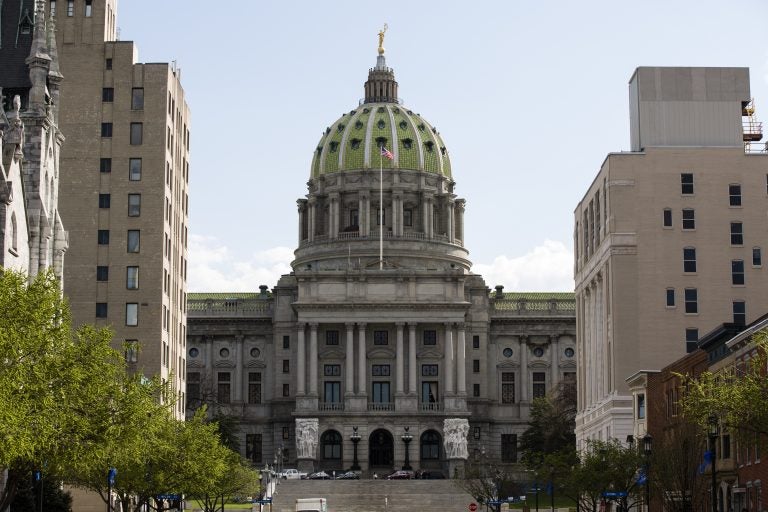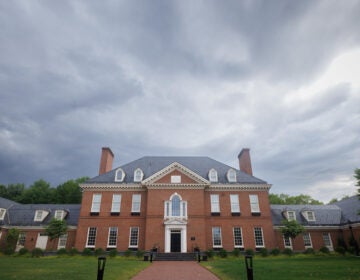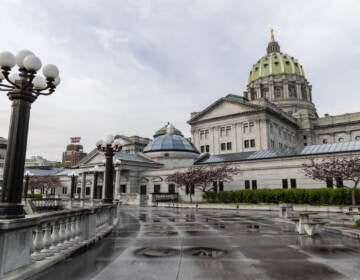Pa. lawmakers black out details of why they spent tax dollars, claiming ‘legislative privilege’
The nearly 3,000 pages of records released so far included information about staff travel, meals, lodging, conference costs, and professional training.

Pennsylvania State Capitol building in Harrisburg, Pa. (Matt Rourke/AP Photo)
Spotlight PA is an independent, nonpartisan newsroom powered by The Philadelphia Inquirer in partnership with the Pittsburgh Post-Gazette and PennLive/Patriot-News. Sign up for our free weekly newsletter.
The Pennsylvania legislature is attempting to shield records showing why it spends some of the roughly $360 million in taxpayer money it receives each year, citing an obscure protection it claims gives lawmakers immunity from total transparency.
The House and Senate have turned over thousands of pages of financial records in response to recent public records requests from The Caucus and Spotlight PA. But many contained vague descriptions of expenses or had redactions that made it impossible to see their purpose.
The redactions primarily concealed whom legislators were meeting with, and why.
In defending their decision to keep the information secret, legislative officials cited an obscure clause in the state constitution that they say protects lawmakers’ ability to speak and debate without retribution — a right they call the “legislative privilege.”
But good-government advocates countered that such an interpretation warped the intent of the speech and debate clause, which, they said, was meant to allow lawmakers to speak freely in official proceedings.
“Seems like a huge stretch,” said David Cuillier, an associate professor of journalism at the University of Arizona and president of the National Freedom of Information Coalition. “I guess there are some seriously creative lawyers there.”
» DONATE NOW to Spotlight PA and help us continue to track your tax dollars in Harrisburg and hold the government accountable. We rely on your support to provide this quality journalism.
The news organizations’ requests — covering all of the legislature’s expenses, except salaries and benefits, from 2017 through 2019 — are part of a collaborative effort to document the spending of the nation’s largest full-time legislature.
The nearly 3,000 pages of records the House and Senate have released so far included information about staff travel, meals, lodging, conference costs, and professional training. Often, descriptions for expenses were vague, making it difficult to identify who spent the money and for what purpose.
Of the redactions, some were to protect personal information such as bank account numbers or home addresses. In dozens of other instances, however, legislators invoked the speech and debate privilege to black out information about whom they and their staff spent money to meet with, and the purpose of those meetings.
For instance, four charges of $95.25 each for staffers who stayed overnight in Pittsburgh say only that they “Met with [REDACTED] … and legislation to create a [REDACTED]…”
A $265.49 lodging and parking charge for a onetime top Senate staffer states that he traveled in January 2018 to Washington, D.C., to “attend meetings on [REDACTED].”
A lawyer for the House has argued that releasing the redacted information would “interfere with the legislature’s independence and unbalance the constitutional equilibrium among the three branches of government.”
Legislators may “be less inclined to engage in the full range of legitimate legislative activities that carry a reimbursable cost, for fear that those activities might be questioned or scrutinized,” Jim Mann, a lawyer for House Republicans, wrote in a brief supporting the redactions, which The Caucus and Spotlight PA are appealing.
The House argues the list of protected activities for lawmakers — who earn a minimum annual salary of $90,000, with leaders earning as much as $141,000 — is lengthy: communications with constituents, internal memos, talking points for speeches, and more.
Officials in the House also say the “legislative sphere” of privileges extends to staffers or anyone who might be working on their behalf.
The constitutional clause they cite appears far less expansive.
“The members of the General Assembly,” it states, “shall in all cases, except treason, felony, violation of their oath of office, and breach or surety of the peace, be privileged from arrest during their attendance at the sessions of their respective Houses and in going to and returning from the same; and for any speech or debate in either House they shall not be questioned in any other place.”
After The Caucus and Spotlight PA challenged some of the redactions, House lawyers restored portions of some documents, providing a glimpse into the details — many trivial — they originally had determined were subject to legislative privilege.
Among the items they revealed: that freshman legislators were regularly treated to coffee and doughnuts (although it was not stated who the legislators were). In another instance, they revealed that a legislator had bought supplies and pizza for a meeting held at a local elementary school.
They also restored information about two breakfast meetings totaling $1,623 that outgoing House Speaker Mike Turzai (R., Allegheny) held last year. Initially, House lawyers had blacked out whom Turzai had hosted. When they unmasked the information, it showed the speaker had met with Eagle Scouts.
The legislature has successfully invoked the clause in the past to shield records such as correspondence that could shed light on deliberations leading up to a vote or other official action. But it has not routinely been used to shield records detailing how and why the House and Senate are spending taxpayer money. House officials said they do not track how often the clause has been used as a reason to redact information.
Though the legislature has largely exempted itself from the state public records law, which applies to most other government entities, financial records are among the few items that legislators are required to make public.
Cuillier, president of the National Freedom of Information Coalition, said legislators are notorious for “secrecy creep.”
“They need to buck up, have some backbone, and be accountable,” he said.
WHYY is your source for fact-based, in-depth journalism and information. As a nonprofit organization, we rely on financial support from readers like you. Please give today.




